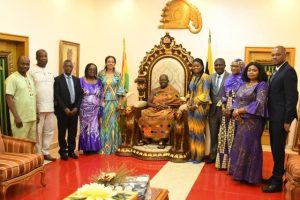A new Bill which seeks to merge the Ghana Institute of Journalism (GIJ), the Ghana Institute of Languages (GIL) and the National Film and Television Institute (NAFTI) into a single university has received Presidential Assent.
The government commenced processes to merge the institutions into a fully fledged university of communication studies in 2019, leading to the formulation of the University of Media Arts and Communication (UMAC) Bill to give legal backing to the merger.
It explained that the move would help create synergies and improve communication studies in the country.
The Rector of the GIJ, Professor Kwamena Kwansah-Aidoo, announced this at the fourth session of the 14th Congregation of the School of Graduate Studies and Research at the institute’s new campus at North Dzorwulu, Accra, yesterday.
Prof. Kwansah-Aidoo said the GIJ was excited about the development because it would provide opportunities to build on synergies and also safeguard the history and identity of each institution.
“As the firstborn of the institutions in this merger, and also the only institution in this triumvirate with a Presidential Charter to award degrees, we would like to assure the President that we are ready to provide the necessary leadership for the realization of our objectives,” he added.
Event
A total of 197 students graduated from the university. They consisted of seven Master of Arts Degree in Journalism and 86 Master of Arts in Public Relations students.
Thirteen others graduated with Master of Arts Degree in Media Management and 91 in Master of Arts Degree in Development Communication.
The Photo Editor of the Graphic Communications Group Limited (GGCL), Mr Douglas Anane-Frimpong, and a member of staff at the Adverts Unit of the GCGL, Mr Azure Imoro Abdulai, were among the graduands.
Mr Seshie Edem was adjudged the Overall Best Student in all disciplines.
Financial clearance
Prof. Kwansah-Aidoo said the GIJ had received financial clearance to recruit more staff in all departments to augment its staff strength.
“As a relatively young and fast-growing tertiary institution, we are still putting in place necessary structures and processes that require more staff and infrastructure,” he added.
The Head of Marketing and Communications at Stanbic Bank, Mr Mawuko Afadzinu, who was the guest speaker, advised the graduands to continuously upgrade their skills to match up with the changing demands of the industry.
He also encouraged them to find creative solutions to everyday problems to give practical meaning to the training they had received for national development.
“The speed of change in the workplace over the past four years has been like none ever. Remind yourselves that the course of education never ends. Keep immersing yourselves in new knowledge and don’t be trapped in the orthodoxy of the past,” Mr Afadzinu added.







